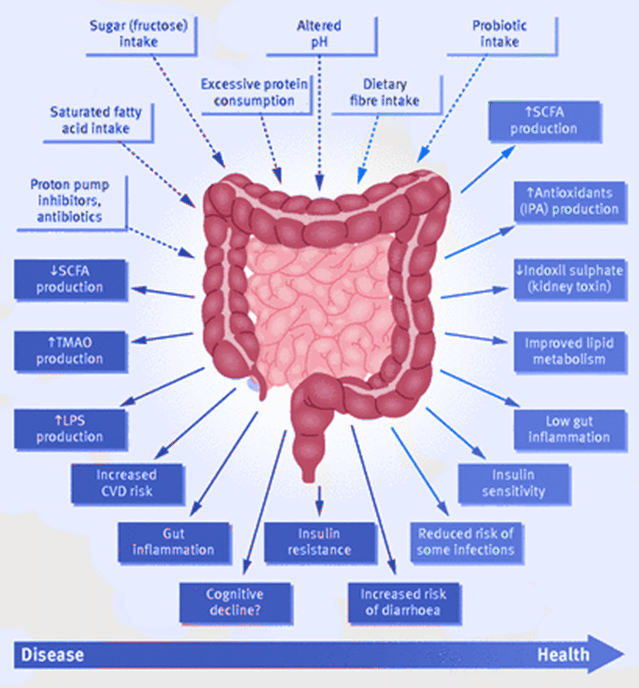Microbiome's Role in Combating Oxidative Stress
Most people don’t realise that trillions of bacteria, viruses, and other microbes, called the human microbiome, live inside our guts. Scientists are finding that these microbes play a big role in fighting oxidative stress and related chronic diseases.
Oxidative stress is implicated in nearly every modern human health condition. It is linked to many problems like inflammation, heart disease, diabetes, and cancer. It can come from sources like pollution, bad diet, and more.
Traditional antioxidant therapies have had limited success in combating this phenomenon. However, emerging research indicates that optimising the gut microbiome could provide a promising new approach.
Understanding the Microbiome: What is the role of the microbiome?
The microbiome present in the human body refers to the trillions of microorganisms that live in our bodies. The gut has the largest and most diverse microbial communities. Research continues to uncover how important the microbiome is for basic body processes like metabolism, immunity, and brain function. A key function of our gut microbes is the maintenance of redox homeostasis.
Redox homeostasis refers to the balance between free radicals and antioxidants necessary for health. Gut microbes play a major role in redox reactions and control of oxidative stress. They make enzymes, metabolites, and signalling molecules that regulate antioxidant levels and activity in the gut. An optimal microbiome provides a line of defence against oxidative damage.
Sources: What is Oxidative Stress?
Oxidative stress happens from an imbalance between free radicals and the body’s ability to counter them. We are constantly exposed to its sources like air pollution, cigarette smoke, radiation, and ozone exposure. Poor lifestyle habits like physical inactivity, excessive alcohol, and chronic stress also contribute.
If this goes unchecked, it can cause substantial cell damage and is implicated in insulin resistance, neurodegeneration, cardiovascular disorders, and cancer development. Our bodies have natural defences like antioxidant enzymes and nutrients that neutralise free radicals. But when pro-oxidant forces become too strong, it overwhelms the body’s normal process.
Antioxidant Defenses Against Oxidative Stress
To counter this, our bodies have antioxidant systems that all work together. Key antioxidant micronutrients are vitamins A, C, E and plant compounds like polyphenols. Glutathione is the most abundant endogenous antioxidant. It works with enzymes like superoxide dismutase, catalase, and glutathione peroxidase to eliminate free radicals.
When our natural antioxidant capacities are exceeded, this phenomenon leads to lipid, protein, and DNA damage. This drives the pathogenesis of chronic diseases. Research shows our microbiome may strengthen antioxidant defences in various ways.
Gut Microbes Combat Oxidative Stress
Emerging research shows probiotic and prebiotic supplementation can enhance antioxidant enzyme activity, thereby reducing oxidative damage. Specific strains like Lactobacillus and Bifidobacterium increase glutathione levels and expression of antioxidant genes. Microbes may also contribute key antioxidants like glutathione and amino acids for glutathione synthesis.
Additionally, microbiome diversity and balance influence redox status. Dysbiosis is linked to lower antioxidant enzyme activity and glutathione depletion. Conversely, microbes like Akkermansia help maintain the antioxidant/oxidant balance. Metabolic byproducts of gut microbes may also have direct antioxidant effects.
Examples include short-chain fatty acids, which can scavenge reactive oxygen species and support redox homeostasis. Overall, an optimal microbiome enhances antioxidant capacity and reduces oxidative damage.
Microbiome Control of Oxidative Stress and Disease
Oxidative stress is increasingly linked to many different health conditions. Emerging studies show microbiome optimization could help combat it driving disease progression:
- In autoimmune disease, oxidative damage contributes to chronic inflammation. Microbiome therapies help regulate redox status and reduce tissue damage.
- Cardiovascular disease involves oxidative change to lipids and apoptosis. Microbiota-derived antioxidants protect against these processes.
- Neurodegenerative disease involves oxidative damage of proteins, lipids, and DNA. Microbiome regulation of brain antioxidants could counteract this.
- Cancer often shows increased reactive oxygen species. An optimised microbiome limits oxidative damage to DNA and cancer development.
These examples show the microbiome’s potential for controlling oxidative stress underlying chronic diseases. Dietary and probiotic interventions to support gut microbe communities may offer therapeutic benefits.
Taking Control of Your Health
A strong gut microbiome in the human body plays a key role in maintaining redox homeostasis balance and defending against oxidative stress. With oxidative damage contributing to diverse diseases, optimising our gut microbes presents a novel therapeutic target. Further research should illuminate how probiotics, prebiotics, and other microbiome-directed therapies can be leveraged to combat this phenomenon. In the future, such approaches may provide effective adjuvant treatment and preventative strategies.
At Helvetica Health Care, we aim to provide efficient testing and diagnostics products that enhance lab research capabilities to detect OS biomarkers. Our range of OXIDATIVE STRESS assay kits and standards is designed to assist in exploring oxidative stress markers and metabolites in human and animal samples and samples exposed to drugs and foods.
The TBARS (Thiobarbituric Acid Reactive Substances) assay has become the assay of choice for screening and monitoring lipid peroxidation, a primary indicator of oxidative stress. The assay can be used with many types of samples, including drugs, food products, and material of human and animal origin, and it provides standardised and reproducible results.
Visit the Helvetica Health Care website to purchase oxidative stress-related products.

